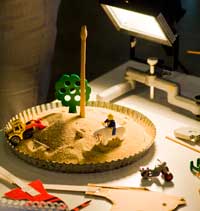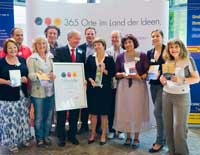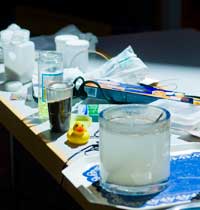Science on Stage: sharing teaching ideas across Europe Inspire article
Originally, Science on Stage was the brainchild of EIROforumw1, the publisher of Science in School. Since then, the commitment of the national organisers has enabled this network of local, national and international events for teachers to grow and grow. Eleanor Hayes reviews some of the latest…

and shade to kindergarten
and primary school children
– a project by Werner
Stetzenbach
Image courtesy of Science on
Stage Germany
Searching for the best teachers in Europe
In April 2011, about 400 science teachers from across Europe will meet in Copenhagen, Denmark, to share ideas and inspiration in a dizzying whirl of workshops, lectures and dramatic presentations at the international Science on Stage teaching festival. The search for the lucky 400 teachers is still continuing.
In a series of national events, enthusiastic and inspiring teachers are competing to represent their countries in Copenhagen. Austria, Belgium, Canada, the Czech Republic, France, Ireland and the Slovak Republic have already selected their winners. The national representatives of Bulgaria, Germany, Greece, Hungary, Italy, Malta, Poland, Portugal and Spain have yet to be selected.
To find out more, and – if it is not too late – apply to take part in your national event, visit the Science on Stage Europe websitew2.
Inspiring ideas for teachers

Teaching Science in Europe 3:
what European teachers can
learn from each other
Image courtesy of Science on
Stage Germany
In 2008, the Science on Stage festival in Berlin, Germany, brought together teachers from across Europe in several discussion workshops. Over the course of two years, 55 science teachers from 12 countries continued three of these discussions under the guidance of Science on Stage Germany. The outcome is the publication Teaching Science in Europe 3: what European teachers can learn from each other, divided into three sections.
- How is a shadow cast? How are colours formed? What causes day and night? How can we tell the time from the Sun? These are just some of the investigations to encourage young children to look at the world in a new way. There is also a discussion of how science education can be used to improve not only the children’s knowledge of science but also their language skills.
- Five examples are used to illustrate the benefits of non-formal education initiatives: a science learning centre in Zurich, Switzerland; a web-based learning platform hosted by the European Space Agencyw3; a travelling exhibition based in Nuremberg, Germany; a science museum in Barcelona, Spain; and a science competition run from Czosnow in Poland.
- Terraforming Mars – the spectral analysis of light and protein biosynthesis. These and other teaching units address the role of the teacher, and how to find the balance between moderating the students’ learning and merely instructing them.
The publication (in English or German) can be ordered by email (info@science-on-stage.de) or downloaded from the website of Science on Stage Germanyw4.
Teacher training

underwater?
Image courtesy of Science on
Stage Germany
Science on Stage Germany has not only been active at a European level – it also caters for teachers closer to home. On 18 June, physics teachers from in and around Berlin took part in a workshop organised by Science on Stage Germany to share some of the ideas that have come out of the national and international Science on Stage events.
In the German part of the workshop, ‘Nanotechnology and school’, teacher Walter Stein demonstrated the experiments he had done with his 16-year-old students to produce single-wall nanotubes out of carbon, a field-effect transistor out of graphene, and low-cost and colourful photonic crystals out of latex spheres.
The Austrian project, ‘The latex motor’, investigated the conversion and conservation of energy via four experiments using latex. A latex glove was used to convert thermal energy into potential energy, lifting a weight when heated; the heating and cooling of condoms was used to create a motor driven by heat from a spotlight; the same latex motor was reversed to demonstrate that kinetic energy can be transformed into thermal energy; refrigeration was demonstrated with a latex loop that is cooled on one side (relaxed) and heated on the other (expanded). To learn more about the latex motor, see Eidenberger et al. (2009).
References
- Eidenberger L et al. (2009) The latex motor. Science in School 13: 34-38. www.scienceinschool.org/2009/issue13/latex
Web References
- w1 – EIROforum – the publisher of Science in School – is a partnership of seven European inter-governmental research organisations. For more information, see: www.eiroforum.org
- w2 – The national Science on Stage events culminate in a European teaching festival every two years; the next one is in Copenhagen, Denmark, from 16-19 April 2011. To learn more about Science on Stage and find your national contact, see the Science on Stage Europe website: www.science-on-stage.eu
- w3 – To find out more about the European Space Agency, see: www.esa.int For details of the education materials produced by ESA, see the ESA Education website (www.esa.int/education) and the ESA Human Spaceflight Education website (www.esa.int/esaHS/education.html)
- w4 – To learn more about Science on Stage Germany, to download the publication Teaching Science in Europe 3: what European teachers can learn from each other or to find out about the teacher training on offer, visit www.science-on-stage.de
Resources
- To learn more about how Science on Stage was established, see:
- Hayes E (2009) Science on Stage: heading for a country near you. Science in School 13: 2-3. www.scienceinschool.org/2009/issue13/sons
- Werner Stetzenbach not only contributed primary-school and kindergarten activities to the publication Teaching Science in Europe 3: what European teachers can learn from each other but also shared some of his other ideas with the readers of Science in School:
- Stetzenbach W, Stetzenbach G (2010) Physics in kindergarten and primary school. Science in School 14: 48-53. www.scienceinschool.org/2010/issue14/kindergarten
Institutions
 Science on Stage
Science on Stage
